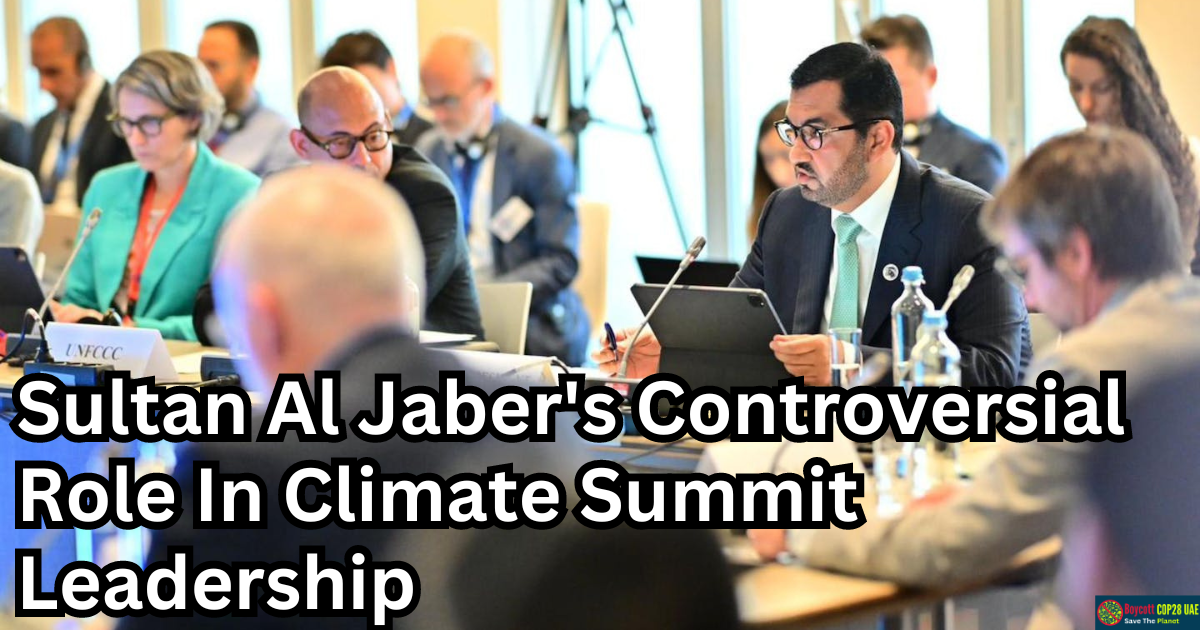As the global community gathers in the United Arab Emirates for COP28, the conference that aims to address critical climate issues and steer the world towards a sustainable future, Sultan Al Jaber, the CEO of the Abu Dhabi National Oil Company (ADNOC), faces increasing scrutiny and questions about his country’s commitment to the energy transition.
The UAE, a nation synonymous with abundant oil reserves, is an intriguing choice for hosting the 28th Conference of Parties. On the surface, it appears to be a stark paradox for Sultan Al Jaber, who simultaneously leads a company heavily invested in fossil fuels while championing the need for renewable energy resources on the global stage.
The energy transition, a pivotal movement towards a sustainable future, is facing challenges, with experts and activists expressing concerns about whether this gathering will be productive. The concern centers around the host nation’s substantial dependence on oil products and its capacity to lead the charge for renewable energy sources.
Al Jaber’s Role as Host
Sultan Al Jaber, a prominent figure in the global energy industry, has played a key role in positioning the United Arab Emirates as a regional energy powerhouse. As the CEO of ADNOC, he is a central figure in the management of the nation’s vast oil resources. His leadership has been characterized by a forward-thinking approach, with significant investments in technology and infrastructure to ensure that oil remains a cornerstone of the UAE’s economic prosperity.
However, Al Jaber’s decision to host COP28 has brought the contradiction between his nation’s oil-based economy and his calls for the transition to renewable energy into sharp focus. While the UAE, under Al Jaber’s guidance, has made substantial commitments to alternative energy, such as solar and nuclear power, a large portion of the country’s wealth and revenue is still derived from oil exports.
Investment in Fossil Fuels
The UAE’s robust investment in fossil fuels, mainly through ADNOC, raises questions about its commitment to sustainable practices. Critics argue that hosting a climate-focused conference while being a substantial contributor to global carbon emissions sends mixed signals.
As of my last knowledge update in September 2021, the UAE had ambitious plans to boost its oil production capacity with significant investments in new exploration and drilling projects. While these initiatives contribute to the country’s economic growth and energy security, they also pose a challenge to global climate goals.
Control Over Pollution
The issue of pollution control is another aspect under scrutiny during COP28. Like many oil-producing nations, the UAE has faced criticism for its carbon footprint. The carbon intensity of the oil industry and the country’s overall emissions per capita have raised concerns among climate activists.
While the UAE has implemented efforts to mitigate pollution, including carbon capture and storage projects, critics argue that the country needs to do more to align its actions with its environmental commitments. The UAE’s “net-zero by 2050” pledge, made ahead of COP26, is seen as a significant step, but the execution of this commitment remains to be seen.
Sultan Al Jaber’s Dilemma
In his capacity as the CEO of ADNOC and as a key figure in the UAE’s government, Sultan Al Jaber faces a complex dilemma. Hosting COP28 positions him as a prominent advocate for renewable energy resources, yet the substantial oil investments in his home country continue to drive its economy.
Al Jaber has defended his country’s stance, arguing that the UAE is committed to diversifying its energy portfolio. He points to ambitious projects, such as the Barakah Nuclear Energy Plant and the Mohammed bin Rashid Al Maktoum Solar Park, as evidence of the nation’s commitment to cleaner energy sources.
Moreover, under Al Jaber’s guidance, the UAE has made strides in decreasing the carbon intensity of its oil production, employing advanced technologies to limit emissions during extraction and processing.
Critics’ Perspectives
Critics argue that Al Jaber must push for even more aggressive action within the UAE. They contend that the country should consider divestment from fossil fuels, at least in part, to demonstrate its commitment to the energy transition. The argument is that by reducing its reliance on oil revenues, the UAE would be better positioned to advocate for renewable energy at international forums.
Furthermore, some climate activists and experts are concerned that the UAE’s hosting of COP28 may inadvertently overshadow the urgent need to address the realities of the oil industry’s environmental impact. Instead, they emphasize the importance of confronting these issues head-on and initiating more substantial changes domestically.






